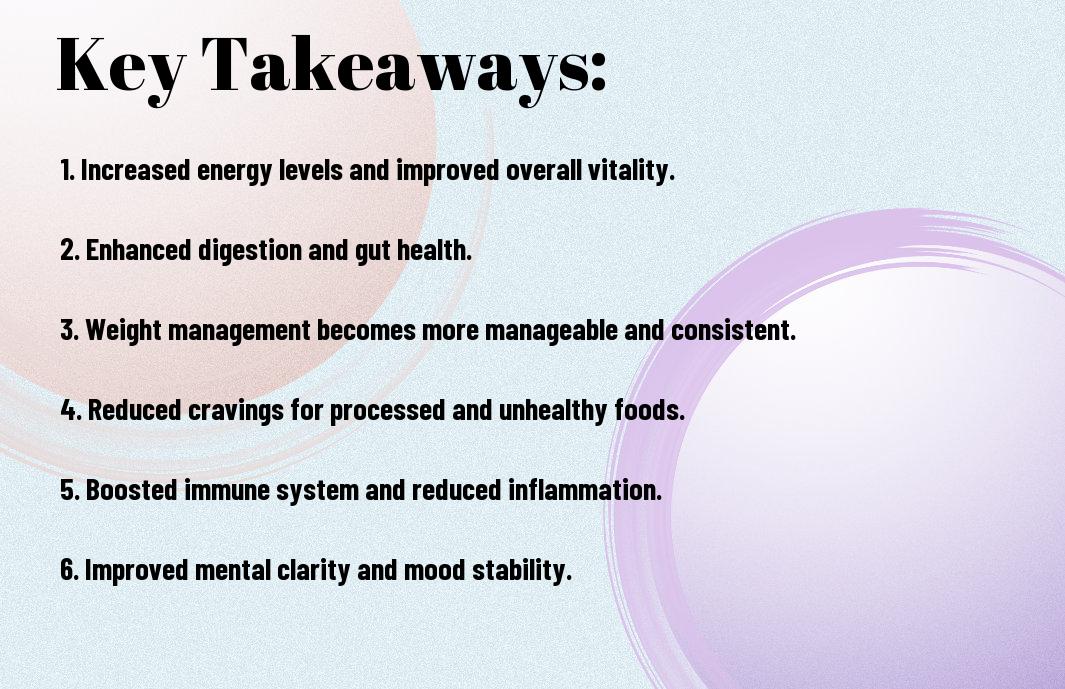It’s fascinating how your body responds when you embrace a whole foods diet. As you start incorporating more fruits, vegetables, whole grains, and lean proteins into your meals, you may experience increased energy levels, improved digestion, and weight management benefits. Your palate will become accustomed to richer flavors, and you might even find yourself craving nutrient-dense foods over processed options. To dive deeper into the transformative effects of this lifestyle, check out Whole-Foods Diet 101: A Complete Beginner’s Guide.
Key Takeaways:
- Improved Nutritional Intake: Transitioning to whole foods boosts your intake of vital vitamins, minerals, and antioxidants, leading to better overall health.
- Enhanced Energy Levels: Whole foods provide sustained energy due to their natural fibers and nutrients, reducing energy crashes often associated with processed foods.
- Better Digestion: A diet rich in whole foods promotes gut health and improves digestion, as they are typically higher in fiber compared to processed options.

Understanding Whole Foods
Your journey towards healthier eating begins with understanding what whole foods are. These foods not only nourish your body but also embody the essence of natural nutrition. Whole foods generally refer to items that are minimally processed and free from artificial additives, enabling you to consume food in its most natural state.
Definition of Whole Foods
For the purpose of this discussion, whole foods are defined as foods that are consumed in their most natural form, without added sugars, preservatives, or artificial ingredients. These foods are typically unrefined and provide important nutrients that support your overall health.
Types of Whole Foods
For the most part, whole foods can be categorized into several types, each offering unique benefits. Below is a table that illustrates different types of whole foods:
| Type | Description |
| Fruits | Natural sources of vitamins, minerals, and antioxidants. |
| Vegetables | Rich in fiber and important nutrients for a balanced diet. |
| Whole Grains | Unrefined grains that contain all parts of the grain kernel. |
| Nuts and Seeds | Healthy fats and proteins that promote heart health. |
| Legumes | Rich in protein and fiber, offering various health benefits. |
- Understanding these categories will help you make informed dietary choices.
- Each category provides unique nutrients important for your health.
- Focusing on whole foods can improve your overall diet quality.
- Incorporating a variety of these foods is key to balanced nutrition.
- Knowing how these whole foods fit into your lifestyle is crucial for lasting change.
Plus, to further illustrate the types of whole foods, consider the diverse options available within each category. Here’s a breakdown to help you explore:
| Category | Examples |
| Fruits | Berries, apples, oranges |
| Vegetables | Spinach, carrots, broccoli |
| Whole Grains | Brown rice, quinoa, oats |
| Nuts and Seeds | Almonds, chia seeds, walnuts |
| Legumes | Chickpeas, lentils, black beans |
- With so many options, you can easily incorporate a variety of whole foods into your diet.
- Exploring different fruits and vegetables can keep meals exciting and nutritious.
- Variety ensures you receive a broad spectrum of nutrients.
- Mixing and matching whole grains can enhance texture and flavor in your meals.
- Knowing your whole food options empowers you to make better dietary choices.
Benefits of Whole Foods
It is imperative to understand the numerous benefits of incorporating whole foods into your diet. These natural and unprocessed foods provide a myriad of positive effects on your health and well-being.
Nutritional Value
Nutritional value plays a significant role in determining the healthfulness of any food. Whole foods are packed with imperative vitamins, minerals, and antioxidants that help your body function optimally, providing you with the nutrients necessary for maintaining your health and preventing chronic diseases.
Impact on Weight Management
To effectively manage your weight, you need a diet that satisfies your body’s nutritional needs while promoting a healthy metabolism. Whole foods can aid in weight management by providing nourishing, low-calorie options that keep you feeling full longer, ultimately reducing your cravings for unhealthy snacks.
Another factor to consider is that whole foods tend to have a lower glycemic index compared to processed options, which helps stabilize blood sugar levels. This stabilization leads to fewer spikes in hunger, allowing you to maintain a more consistent energy level throughout the day and avoid overindulging during meals.
Enhanced Energy Levels
An increased intake of whole foods can significantly enhance your energy levels. These foods provide a slow release of energy, ensuring that you feel more energized and less fatigued throughout the day.
Levels of sustained energy become especially important as you engage in daily activities or exercise. When you nourish your body with whole foods, you’ll find that your endurance and overall physical performance improve, making it easier to stay active and engaged in your life.
Transitioning to Whole Foods
Keep in mind that transitioning to whole foods doesn’t have to be overwhelming. You can start by gradually replacing processed items in your pantry with whole food alternatives. Begin with simple swaps, such as substituting white rice with quinoa or opting for whole grain bread instead of white bread. Aim to incorporate more fruits and vegetables into your meals, and soon, you’ll find that whole foods become more prominent in your diet.
Steps to Incorporate Whole Foods
Whole foods are all about simplicity and nutrition. Begin your journey by educating yourself on which foods fit the whole foods category, such as fresh produce, nuts, seeds, whole grains, and legumes. Create a shopping list that focuses on these items while eliminating processed snacks and refined ingredients. With time, your taste buds will adjust, making it easier to choose whole foods over their processed counterparts.
Overcoming Challenges
Challenges may arise as you shift your eating habits, but understanding these obstacles can help you navigate them. You might experience cravings for convenience foods or feel overwhelmed by meal preparation. It’s crucial to anticipate these hurdles and remind yourself of your health goals, allowing you to stay motivated and focused on the benefits of whole foods.
Foods that are convenient, like ready-made meals or snacks, can tempt you during your transition. Instead, focus on preparing your own meals and keeping wholesome snacks on hand. By dedicating time each week for meal prep and convenience, you’ll find it easier to avoid processed options and remain committed to your whole foods journey.
Meal Planning Strategies
Whole food meal planning is necessary to ensure you enjoy a diverse and balanced diet. Start by selecting one or two new recipes each week that emphasize whole food ingredients, and make sure to plan meals that can use leftovers creatively, reducing waste and saving time.
With thoughtful meal planning, you can set yourself up for success. Create a weekly menu that includes breakfast, lunch, and dinner, focusing on incorporating fresh ingredients and whole grains. This strategy not only helps you maintain your commitment to whole foods but also saves you time and money while making your meals more exciting and nutritious.

Summing up
As a reminder, when you start eating whole foods, you’re likely to experience improved energy levels, better digestion, and enhanced overall health. Your body benefits from nutrient-dense foods that are less processed, which can lead to a healthier weight, and improved mental clarity. Embracing a whole foods diet also encourages you to make mindful food choices, ultimately fostering a positive relationship with what you eat. For more detailed insights and practical resources, check out the Whole Foods Diet Guide: Meal Plans and Shopping Lists.
FAQ
Q: What are whole foods and how do they differ from processed foods?
A: Whole foods are natural, unprocessed foods that are free from artificial additives and preservatives. They include fruits, vegetables, whole grains, nuts, seeds, and legumes. Unlike processed foods, which often contain refined sugars, unhealthy fats, and other additives, whole foods retain their natural nutrients and are typically higher in fiber, vitamins, and minerals. By choosing whole foods over processed options, you can nourish your body more effectively.
Q: What noticeable changes can I expect in my body after starting a whole foods diet?
A: When you start eating whole foods, many people report increased energy levels, improved digestion, and better mood regulation. Your body may begin to detoxify from the additives and preservatives found in processed foods, which can result in temporary symptoms like headaches or fatigue as toxins are eliminated. However, over time, you may experience weight loss, clearer skin, and enhanced overall health as your diet becomes richer in necessary nutrients.
Q: Will switching to whole foods impact my cravings for junk food?
A: Yes, making the transition to whole foods can significantly impact your cravings for junk food. Initially, you may experience withdrawal symptoms such as cravings for sugar or salty snacks. However, as your body adapts to a diet rich in whole foods, many people find that their cravings diminish. Whole foods tend to be more satiating due to their higher fiber content, which helps regulate hunger hormones and can reduce the desire for unhealthy snacks.
Q: Can eating whole foods lead to better health outcomes?
A: Absolutely! Numerous studies have shown that adopting a whole foods diet can lead to improved health outcomes, including lower risks of chronic diseases such as heart disease, diabetes, and obesity. Whole foods are packed with antioxidants, anti-inflammatory compounds, and necessary nutrients that support immune function and overall well-being. Furthermore, a whole foods diet encourages healthier habits, which can contribute to long-term health and longevity.
Q: How can I effectively transition to a whole foods diet?
A: Transitioning to a whole foods diet can be achieved gradually to make it more manageable. Start by incorporating more whole foods into your meals, such as adding fresh fruits and vegetables, whole grains, and lean proteins. Begin by replacing processed snacks with healthier alternatives like nuts, seeds, or fruit. Plan your meals in advance to ensure you have whole food options readily available. Educate yourself on whole food recipes and experiment with cooking to discover new flavors and combinations.

